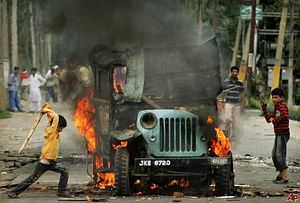On Monday, the General Secretariat of the Organization of Islamic Cooperation (OIC) issued a condemnation for the “wicked terrorist act by Indian forces in Indian-occupied Kashmir” after seven civilians were killed in Pulwama district on Saturday.
The OIC condemnation came after Pakistan’s Foreign Minister Shah Mehmood Qureshi wrote to the secretary general, with the United Nations secretary general and the UN High Commissioner for Human Rights also being approached.
While the OIC has called out Indian state brutalities in the past, the severity of the language in its latest statement is unprecedented, with the group categorically dubbing the Indian armed forces’ action “terrorism.”
Over the years, the OIC has largely expressed “deep concern” and “disappointment” and requested “restraint” in Indian-administered Kashmir. Even when violence escalated in summar 2016 following militant commander Burhan Wani’s killing in Kashmir, the then-OIC Secretary General Iyad Ameen Madani could only “express sorrow.”
Therefore, the language of the OIC’s condemnation this week is a clear diplomatic triumph for Pakistan, which has seen its narrative on Kashmir being increasingly ignored around the world, including Muslim states.
This was perfectly epitomized at the U.S. President Donald Trump-led Arab Islamic American summit in Riyadh last year. Trump, speaking amid representatives of the Muslim world, not only snubbed Pakistan, but actually called out Kashmiri separatist militancy as “terrorism.”
Probably the greatest demonstration of Muslim states’ indifference toward Kashmir is Saudi Arabia signing defense and counterterror pacts with Prime Minister Narendra Modi’s Bharatiya Janata Party (BJP) government, under whose watch there has been an increase in anti-Muslim violence across India.
Pakistan’s diplomatic isolation, and the decreasing number of takers of its position in Kashmir, means that Islamabad has been increasingly hyphenating Kashmir and Palestine in a bid to gather more support around the world. Yet the Palestinian leadership has failed to back Pakistan’s Kashmir stance, and Israel maintains “there is no difference between Lashkar-e-Taiba and Hamas.” Islamabad has largely been devoid of diplomatic backing.
Hence, at a time while Islamist militancy is being universally shunned as terrorism, for the OIC to describe Indian state action as such provides legitimacy to Islamabad’s Islamist narrative – even if the backing has come from a group that represents Muslim states.
Pakistan will be looking to cash in on the diplomatic brownie points that it has won against India. Even so, Pakistan’s leaders are clearly not giving any thought to how Islamabad’s Islamist narrative on Kashmir has been detrimental for Pakistan itself.
The mullah-military stranglehold over the country has brewed jihadism in Pakistan for decades, with the military establishment’s desire to channelize militant Islamist groups toward India and Afghanistan having resulted in a boomeranging of terror on the state itself.
While tens of thousands of lost their lives owing to the jihadist maneuvers of the groups that got out of the Pakistan Army’s control, it has been mainstreaming the outfits so as to keep a check on the civilian leadership.
Hence, upholding the Islamist narrative continues to fuel jihadism in Kashmir, while sustaining the multipurpose “strategic assets,” whose militants are deployed for cross-border assignments while their political wings clip civilian authority.
And so, at a time when Islamabad should be pushed to reform its position on Kashmir purely on humanitarian grounds, the OIC echoing its narrative will mean Pakistan continuing to call out human rights abuses in Kashmir around the world, while domestically selling jihad as the “only rightful solution” to the conflict.
It might be worth reminding the state that it is Kashmir-bound jihadists like Hafiz Saeed, and his affiliated groups, who have brought Pakistan toward the potential threat of being blacklisted by the Financial Action Task Force.
Therefore, while Muslim countries might back an Islamist narrative in Kashmir, it is hard to get the rest of the world to buy it. Least of all China, where Pakistan is pinning all its hopes for sustained diplomatic and economic backing.

































